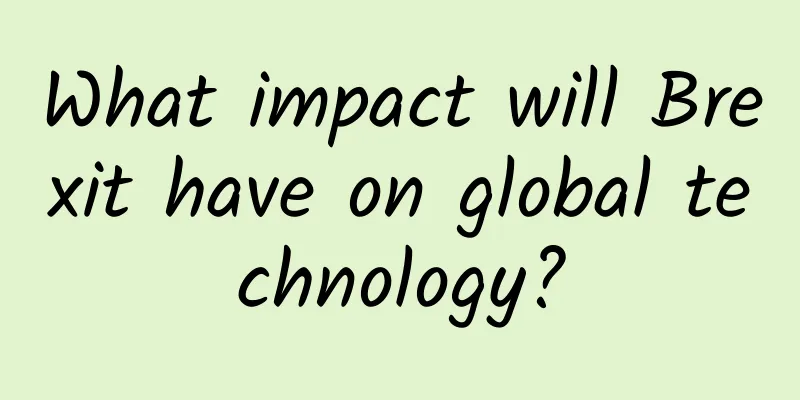What impact will Brexit have on global technology?

|
(Original title: Fortune: What impact will Brexit have on global technology? ) Late evening of June 24th, Beijing time, Fortune website published an article today saying that Britain's withdrawal from the European Union will have a profound and complex impact on the global technology industry. Although British citizens have voted to leave the EU, it will take some time for the UK to actually leave the EU. British Prime Minister David Cameron said today that he will have to stay in office for another three months before handing over power to his successor. Cameron also said that he hopes the next prime minister will negotiate with the EU on Brexit. The negotiations may take two years, in other words, the UK may have to wait until 2018 to actually leave the EU. This means that the UK will face several years of uncertainty, and technology companies and investors are unsure about how future regulatory policies in the UK and even the EU will change.Suppressing American companies Ben Thompson, a contributor to the technology blog Stratechery, said that Britain is one of the EU member states with relatively loose technology regulation. After Britain leaves, Germany and France will take a tougher stance in the EU. Germany and France have long been actively advocating the suppression of US technology companies, such as Google. Without the British obstruction, Germany and France will take a tougher stance and the situation may be more serious. Another issue is data and cross-border data flows. As early as 2013, after the US government’s “wiretapping scandal” was exposed, the data sharing agreement between the EU and the US government was questioned. Data transfer The European and American data sharing agreement, also known as the "Safe Harbor Agreement," was signed by the U.S. Department of Commerce and the European Union in December 2000 to regulate U.S. companies' export and processing of European citizens' personal data, such as names and addresses. In short, this agreement is mainly to facilitate companies to transfer data between the EU and the United States. But the Court of Justice of the European Union, Europe's highest court, announced in October last year that the 15-year-old EU-U.S. data-sharing agreement would be immediately invalidated. In its ruling, the European Court of Justice said that if the 500 million EU residents found that their privacy was violated by U.S. companies or governments, they had no right to sue in U.S. courts. So far, the two sides have not reached a final new agreement. Although negotiators announced a breakthrough on Friday, it is too early to celebrate. When leaving the EU, the UK will face the same problems as the EU. This has been confirmed by the UK Information Commissioner's Office (ICO), which said today that the UK's current Data Protection Act, which is based on old EU regulations, remains valid, but the upcoming EU privacy reform (introducing the stricter General Data Protection Regulation) will no longer apply directly to the UK. This means that even if the UK successfully leaves the EU, it will still have to reform its privacy protection laws to comply with the new EU regulations, otherwise it will face major obstacles to cross-border data transfer. The ICO said: "Given the growing digital economy, it is more important than ever to have clear protection laws. We will communicate with the government and convey our view that amending UK law is necessary." Foreign technology companies Foreign technology companies may not be very interested in the details of the new EU regulations, but they will at least welcome the consistency they promise. The EU's current privacy protection laws can be said to be a patchwork and not unified enough. I believe the new General Data Protection Regulation will solve this problem. So tech companies might also want the UK to align itself with the EU in this regard. But that might not be enough to solve all the problems. For example, one of the big issues is government surveillance. The main reason for the failure of the Safe Harbor Agreement was the US government's large-scale surveillance policy. Similarly, the UK also has large-scale surveillance plans that affect other countries. However, when the UK was still a member of the EU, its actions did not affect the transmission of data between the UK and other European member states. Once Brexit occurs, the situation will take a sharp turn for the worse. In the future, it is not certain that Britain will continue to participate in the European single market, despite Brexit supporters' promises that it can do so, but negotiations will be tricky in the face of hostility from EU countries. Competitors become winners In fact, most British technology startups are against Brexit. They believe that Brexit will undermine industry confidence and make it more difficult to attract talent from abroad. For example, Microsoft has said that Brexit will make it impossible for it to invest more in the UK. At the same time, this will give British competitors more opportunities. Just hours after the vote was announced, Berlin venture capital firm German Startups Group issued a statement saying: "Brexit is good news for the German startup sector." Christoph Gerlinger, CEO of German Startups Group, said: "London has always been the main financing transaction center for new companies in Europe until it was surpassed by Berlin in 2015. After Brexit, I believe Berlin will leave London further behind." In addition, the German Startup Association also believes that Berlin will be the winner after Brexit. Impact on consumers For technology users, after Brexit, British people may not be able to get cheap mobile calls and data when they go to EU countries. Because the new EU network neutrality law may not apply to the UK, this is not good news for British consumers. Another thing worth paying attention to is wireless spectrum resources. Currently, the European Union is preparing to coordinate the allocation of frequency bands internally to help mobile device manufacturers achieve economies of scale. With 5G coming soon, no one wants to see countries disagree on the allocation of ultra-high-speed mobile broadband frequency bands. After Brexit, the UK will no longer have to follow EU decisions. Of course, as with the privacy law mentioned above, aligning with the EU will be the most obvious choice. Today, everyone is paying attention to the impact that Brexit will have on the global market. The technology industry is no exception and will inevitably be affected to a certain extent. In the long run, this impact will be profound and complex. As a winner of Toutiao's Qingyun Plan and Baijiahao's Bai+ Plan, the 2019 Baidu Digital Author of the Year, the Baijiahao's Most Popular Author in the Technology Field, the 2019 Sogou Technology and Culture Author, and the 2021 Baijiahao Quarterly Influential Creator, he has won many awards, including the 2013 Sohu Best Industry Media Person, the 2015 China New Media Entrepreneurship Competition Beijing Third Place, the 2015 Guangmang Experience Award, the 2015 China New Media Entrepreneurship Competition Finals Third Place, and the 2018 Baidu Dynamic Annual Powerful Celebrity. |
>>: Jawbone ends: The smart wearable device market is sailing high but the wind is not yet coming?
Recommend
A "date" between ice and fire? A duet of Antarctic volcanoes
Cold, still, solidified, white - that is ice and ...
Operation and promotion: How do Pinduoduo, Xinshixiang, etc. achieve fission?
In the second half of 2018, there were fewer conc...
The cute incarnations of ice and snow: How Bing Dwen Dwen and Shuey Rhon Rhon were born
Like the competition venues, mascots are also imp...
5.5G is here! What changes will the extra 0.5 bring? Do I need to change my phone?
Editor: Sunny Morning Recently, the world's f...
Online Advertising in Internet Business Monetization
This article introduces the product features and ...
Is it a black technology that the range hood can watch videos? See how Haier does it
With the continuous deepening of the Internet eco...
Analysis of WeChat Reading VS NetEase Wuniu Reading Competitive Products
This article conducts a competitive analysis of W...
10 Tips to Quickly Improve Your User Interface
Creating a beautiful, easy-to-use, and efficient ...
Once again brought back childhood memories. Complete TV version of "Balala the Fairies" game experience
Previously, the review room had tried out the TV ...
Can iOS14.5 protect your privacy?
Introduction Do you often feel that when you ment...
How to improve user retention rate? 6 strategies used by the entire Internet finance industry
This article will use the Internet finance indust...
Eight "cheating" methods for APP promotion to solve the APP application promotion road
Eight "cheating" methods to promote APP...
Dark Mode or Black Mode? WeChat has confused everyone
A while ago, WeChat officially added support for ...
How to build your first community from 0 to 1?
Five steps to build your first community Like-min...
BAK Battery will mass-produce super batteries next year, with the largest share of domestic cylindrical battery market
On September 16, BAK Battery and Cadenza Innovati...









